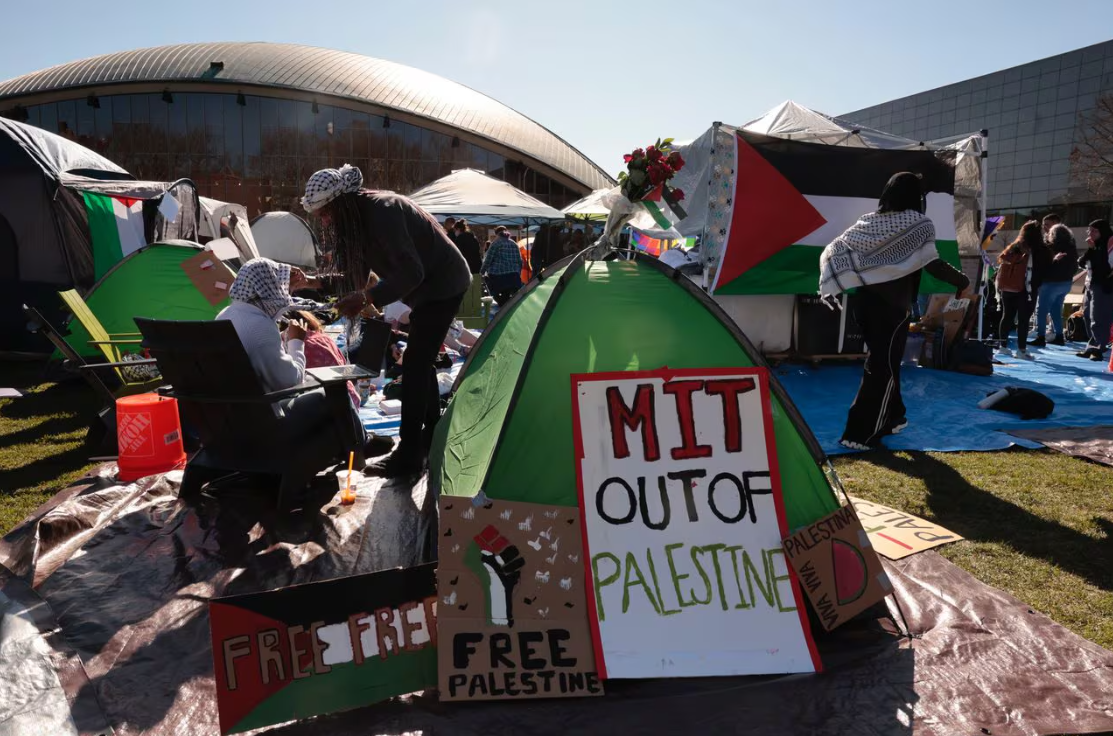麻省理工学院校长表示校园内的亲巴勒斯坦营地需要逐渐减少 学生示威者上周日建立了营地

【中美创新时报2024 年 4 月 27 日编译讯】(记者温友平编译)麻省理工学院院长萨利·科恩布鲁斯在周六的一段视频中表示,克雷斯吉草坪上支持巴勒斯坦人和抗议以色列在加沙战争的营地需要停止。《波士顿环球报》记者 Laura Crimaldi 和 Sean Cotter对此作了下述报道。
“这种特殊的表达形式需要尽快结束,”她在麻省理工学院社区的视频中说。
周六早些时候,警方拆除了东北大学校园内的一个营地,导致约 100 人被拘留。
视频讲话引起了麻省理工学院巴勒斯坦联盟的回应,该联盟在一份声明中表示,该组织已于周五与大学领导人会面,并计划于周六下午举行另一次会议,讨论要求学校切断与以色列军方关系的要求。
但该联盟的声明称,就在周六会议原定开始前不久,麻省理工学院的管理人员取消了会议。
声明称:“麻省理工学院政府选择退出谈判桌,是恶意的,没有提供任何合法的反制,还对营地的学生和工作人员进行了威胁。” “他们独自选择关闭谈判之门。”
周六早些时候,示威者聚集在麻省理工学院营地“大声疾呼”,期间向人群通报了抗议者与大学领导人之间谈判的情况。
“在我们的要求得到满足之前,我们不会停止,”大四学生莎拉·布伊扬 (Shara Bhuiyan) 说,她告诉人群,她是与麻省理工学院管理人员谈判的团队成员。
麻省理工学院的营地组织者穆罕默德·穆罕默德表示,其他校园的逮捕行动使他们的使命变得更加重要,并要求人群为在东北大学被捕的人的保释基金捐款。
“他们忍受了政府和警察的暴行,”他说。
研究生英吉·巴霍 (Ingie Baho) 表示,关于其他校园逮捕事件的讨论很多,但抗议者并不打算离开。
“这里的人们很坚定,他们不会动摇,”她说。
麻省理工学院的学生示威者上周日在全国抗议活动日益激烈的情况下建立了营地,要求大学切断与以色列及其军队的经济联系。
哈佛大学和塔夫茨大学的校园里也出现了营地。星期四一早,警察拆除了爱默生学院的另一个营地,并逮捕了 100 多人。
学生抗议者表示,他们设立营地是为了引起人们对加沙平民困境的关注。10 月 10 日哈马斯领导的袭击以色列后,以色列在报复行动中进行轰炸和入侵,造成加沙平民的困境,造成超过 34,000 人死亡。那次袭击造成 1,200 多人死亡,另有 250 人被绑架。
科恩布鲁斯在视频致辞中谈到了全国大学因校园抗议以色列-哈马斯战争而面临的难题,并表示她和麻省理工学院的其他领导人花了几个小时会见“持有不同观点”的人们。
“我们被迫选边站队,我们也被指责选边站队。我们被告知必须立即拆除营地,并且必须允许它留下来,纪律不是答案,但却是唯一的答案,”科恩布鲁斯说。“我只能用不可调和来形容各种观点。”
在视频附带的注释中,科恩布鲁斯表示,她本来打算在周五分享她的信息,但暂停了,因为麻省理工学院的领导人正在与学生示威者就营地问题进行谈判,他们希望“取得进展是可能的”。
周六早上,她说有两个进展:学生们“在社交媒体上明确表示”他们不打算在自己的要求上妥协,一些学生扰乱了麻省理工学院的官方活动。
科恩布鲁斯表示,她对校园保持和平表示赞赏,但表示营地违反了麻省理工学院的规定,违规者将面临“纪律处分”。她说,校园警察全天候守候在营地,并警告说,这“正在为破坏性的外部抗议者制造潜在的吸引力”。
她还表示,她不会“在任何研究领域损害我们教师的学术自由”。
她说:“教师们经常与世界各地的同事合作,包括以色列的同事,我们校园内所有赞助的研究都是公开共享、可出版的,并且免费提供给世界各地的研究人员。”
在哈佛大学,该大学无限期限制外界进入哈佛庭院,周三,一个学生团体在那里建立了营地。
学校发言人周六在一封电子邮件中表示,只有持有大学身份证的人才能进入院子。哈佛深红学生报纸周五晚上首先报道了这些限制。
在塔夫茨大学,巴勒斯坦正义学生组织在该组织的 Instagram 页面上表示,示威者已经在学术广场上活动了三周,并要求捐助者为加沙互助组织捐款。
塔夫茨大学学生团体周六在其 Instagram 页面上写道:“尽管受到行政压力,我们的加沙团结营地仍在不断壮大。” “在我们的要求得到满足之前,我们不会采取行动。”
该组织周六没有回应通过其 Instagram 页面发送的置评请求。
塔夫茨大学发言人帕特里克·柯林斯 (Patrick Collins) 在一封电子邮件中表示,学术区的部分区域有 10 个帐篷,“示威者数量与之相当”。
柯林斯说:“我们将继续积极、密切地监视局势。” “虽然学生可以表达自己的观点,包括在校园示威,但我们将追究任何从事违反大学政策行为的社区成员的责任,包括扰乱教育或研究活动或大学运营行为。”
题图:麻省理工学院的学生示威者在克雷斯吉草坪设立了一个营地,以引起人们对加沙巴勒斯坦人困境的关注。CRAIG F. WALKER/GLOBE STAFF
附原英文报道:
MIT president says pro-Palestinian encampment on campus needs to wind down
Student demonstrators established the encampment last Sunday
By Laura Crimaldi and Sean Cotter Globe Staff,Updated April 27, 2024
MIT President Sally Kornbluth, in a videotaped message Saturday, said an encampment on Kresge Lawn supporting Palestinians and protesting Israel’s war in Gaza needs to wind down.
“This particular form of expression needs to end soon,” she said in a video to the MIT community.
Kornbluth’s message came hours after police removed an encampment early Saturday on the campus of Northeastern University, resulting in the detention of about 100 people.
The video address drew a response from the MIT Coalition for Palestine, which said in a statement that the group had met Friday with university leaders, and had another meeting scheduled for Saturday afternoon to discuss demands that the school cut ties with the Israeli military.
But a short time before Saturday’s session was scheduled to begin, MIT administrators canceled, the coalition’s statement said.
“The MIT administration has chosen to exit the negotiating table, in bad faith, without offering any legitimate counter, and coupled with threats against the students and workers of the encampment,” the statement said. “They alone chose to shut down the door on negotiations.”
Earlier Saturday, demonstrators gathered at the MIT encampment for a “speak out” during which the crowd was briefed on negotiations between protesters and university leaders.
“We will not stop until our demands are met,” said Shara Bhuiyan, a senior who told the crowd she’s a member of the team negotiating with MIT administrators.
Mohamed Mohamed, an encampment organizer at MIT, said the arrests at other campuses make their mission more important and asked the crowd to donate to a bail fund for people arrested at Northeastern.
“They have endured brutality from the administrations, brutality from police,” he said.
Ingie Baho, a graduate student, said there’s a lot of talk about arrests on other campuses, but that protesters don’t plan to leave.
“The people here are steadfast and they will not be moved,” she said.
Student demonstrators at MIT established the encampment last Sunday amid growing national protests demanding that colleges cut financial ties to Israel and its military.
Encampments have also popped up on the campuses of Harvard and Tufts universities. Early Thursday morning, officers dismantled another encampment at Emerson College, where more than 100 people were arrested.
Student protesters say they have set up the encampments to bring attention to the plight of civilians in Gaza, where more than 34,000 people have been killed as a result of Israel’s bombardment and invasion during retaliatory operations following the Hamas-led attack on Israel on Oct. 7. More than 1,200 people were killed and another 250 were kidnapped in that attack.
In her video message, Kornbluth addressed the conundrum facing colleges nationwide over campus protests against the Israel-Hamas war and said she and other MIT leaders have spent hours meeting with people “across a broad range of views.”
“We are being pressed to take sides, and we’re being accused of taking sides. We’ve been told that the encampment must be torn down immediately, and that it must be allowed to stay, that discipline is not the answer, and that it is the only answer,” Kornbluth said. “I can only describe the range of views as irreconcilable.”
In a note accompanying her video, Kornbluth said she had intended to share her message on Friday, but paused because MIT leaders were in talks with student demonstrators about the encampment and they were hopeful “progress was possible.”
Then Saturday morning, she said there were two developments: Students “made clear on social media” that they don’t intend to compromise on their demands and some students disrupted an official MIT event.
Kornbluth said she appreciated that the campus has remained peaceful, but said the encampment violates MIT rules and that rule-breakers will face “disciplinary action.” Campus police are at the encampment around the clock, she said, and warned that it “is creating a potential magnet for disruptive outside protestors.”
She also said she is not “going to compromise the academic freedom of our faculty, in any field of study.”
“Faculty routinely work with colleagues around the world, including in Israel — and all sponsored research on our campus is openly shared, publishable, and freely available to investigators everywhere,” she said.
At Harvard, the university has restricted outside access indefinitely to Harvard Yard, where a student group established an encampment Wednesday.
Only people with university identification cards will be allowed to enter the yard, a school spokesperson said Saturday in an email. The restrictions were first reported Friday night by The Harvard Crimson student newspaper.
At Tufts University, Students for Justice in Palestine said on the group’s Instagram page that demonstrators have had a presence on the academic quad for three weeks and asked donors to make contributions to Gaza Mutual Aid Collective.
“Our Gaza Solidarity Encampment grows despite administrative pressure to take it down,” the Tufts student group wrote Saturday on its Instagram page. “We will not move until our demands are met.”
The group didn’t respond Saturday to a request for comment sent through its Instagram page.
In an email, Patrick Collins, a spokesperson for Tufts, said there are 10 tents on a portion of the academic quad and a “similar number of demonstrators.”
“We continue to actively and closely monitor the situation,” Collins said. “While students are permitted to express their views, including demonstrating on campus, we will hold accountable any community members who engage in conduct that violates university policy, including disruption of education or research activities or the conduct of university operations.”

